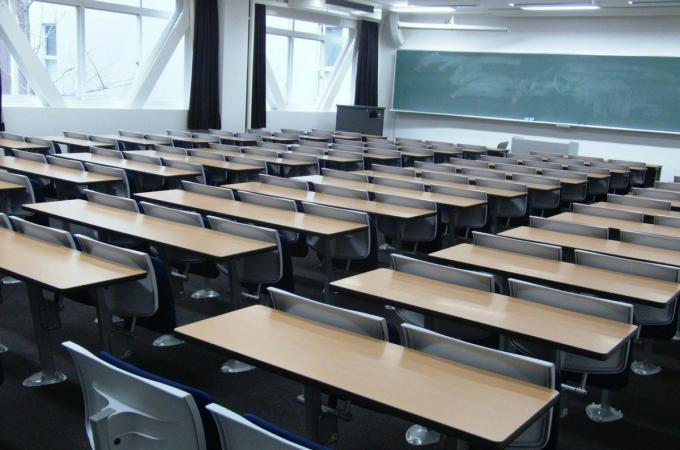We deserve better
Have you ever wondered why the greatest, the richest country in the history of mankind has such a rotten educational system? How it is that over the last 40 years, we have had one elementary and high school reform movement after another, and still math and reading scores have remained flat? And why do countries like Slovenia and Lithuania, which spend a fraction of what the United States spends on elementary and secondary education, dramatically outscore American kids on intellectual achievement tests?
And while you are at it, do you wonder why -- in spite of its poor performance -- your local school system and its echo chamber in the media are continually guilt-tripping you about not paying enough school taxes? Do you really think there is a direct link between dollars spent on schooling and your children's success in life?
And, do you wonder, what that "success" is the schools are holding out to our children? These days they are rarely clear about the meaning of that all-important success. We get vague and unmeasured terms like "good citizenship," "academically proficient," and our favorite: "workplace-ready skills."
But what is it really that our schools are aiming at? Is it higher scores on the SAT, our gateway to elite and not-so-elite colleges? Is it emotional maturity as promised by the latest psychological fad, Social Emotional Learning (SEL), which is currently infecting our schools?
If you are unfamiliar with SEL, don't waste your time Googling it because it will soon be replaced by an even more trendy training program, "mindfulness," a mix of yoga and meditation that many suburbanites are practicing as a replacement for mental prayer. The parade of educational "innovations" is endless.
Once upon a time, schools had two primary goals: the development of intellectual skills and the formation of good character. First, students were to develop competence in a set of intellectual skills, such as the English language, geometry, an understanding of the principles of American democracy and where modern America fit in the long history of the human race.
Second was character formation. Yes! Our public schools were charged with forming the good habits of children, so they could live good lives. And, yes, there was a generally accepted understanding of what constitutes a good life. The good habits had funny, archaic names, such as prudence, persistence at hard tasks, truthfulness, docility, and others. Teachers actually thought that was part of their job responsibility. They were confident that their students' parents and school administrators backed them up as they pushed and pulled kids to acquire these good habits. Adults were united in the belief that such work was beneficial both for the child and society. How quaint!
The current ideological split that divides Americans has had profound effects on what is taught in schools. This is no more evident than in the curriculum. That is, what teachers are hired to teach. Today, we have "advanced" so far that there is no consensus of what represents a core of intellectual skills. What stories should students learn? What values do these stories represent? With our multicultural sensitivities, we, of course, don't want to offend or make some students uncomfortable with stories of characters with strong religious values.
One of the most persistent complaints about our public schools is that they don't teach history, that children don't know the American story. That they don't know who the Founding Fathers were, what they thought, why they broke away from England, and the governing principles and institutions they set in place to guide the new nation. What they do know, however, is that "most of those guys were slave owners."
Ask a high school student who was the primary author of the Declaration of Independence, the third president of the U.S., and initiator of the Louisiana Purchase. Then brace yourself for a blank look. Ask him who was the president who had sex with his black slave, his eyes will light up in recognition and chances are the name Jefferson will roll out. The alert student may even announce the name Sally Hemming. What passes for American history in so many classrooms is an unforgiving indictment of free trade capitalism and the brutal suppression and exploitation of Native American Indians, blacks, and minorities.
There are many causes for the current disgraceful performance of so many of our students. One is the amount of time and psychic energy children are devoting to entertaining themselves with mind-numbing pop culture; their daily consumption of hours and hours of TV and time spent on social media. Then, there is the stranglehold of the two teacher associations whose primary incentive is attending to the bread and butter issues of teachers and impeding serious school reform.
That said, there is one untried reform that is quietly gaining support in our country. It is a transformative idea that is consistent with America's spirit of liberty and self-determination. It harnesses the strong and instinctive desire of parents for the success of their own children rather than the murky success of the Educational Establishment. At its heart, this reform replaces monopolistic educational decision-making of the state with the individualist decision-making of parents. It goes by the name of "choice."
Today, educational choice is a luxury of the rich or the religiously committed who are ready to make great financial sacrifice to educate their children. Nevertheless, more and more Americans, particularly minority parents whose children are trapped in failing schools, are beginning to call for the right to determine the education and, thus, the future of their children. So, too, religious parents desperate to protect their children from the corrupting secularism of the public schools. They want and deserve choice.
- Kevin and Marilyn Ryan, editors of "Why I'm Still a Catholic," worship at St. Lawrence Church in Brookline, Mass.



















